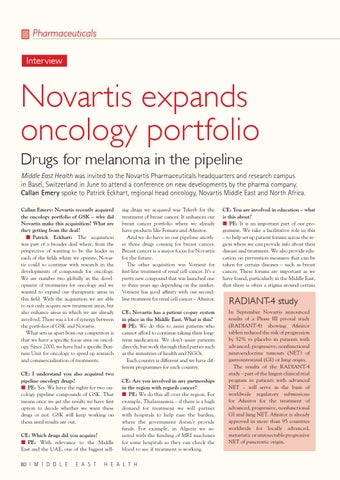Pharmaceuticals Interview
Novartis expands oncology portfolio Drugs for melanoma in the pipeline Middle East Health was invited to the Novartis Pharmaceuticals headquarters and research campus in Basel, Switzerland in June to attend a conference on new developments by the pharma company. Callan Emery spoke to Patrick Eckhart, regional head oncology, Novartis Middle East and North Africa. Callan Emery: Novartis recently acquired the oncology portfolio of GSK – why did Novartis make this acquisition? What are they getting from the deal? n Patrick Eckhart: The acquisition was part of a broader deal where, from the perspective of wanting to be the leader in each of the fields where we operate, Novartis could to continue with research in the developments of compounds for oncology. We are number two globally in the development of treatments for oncology and we wanted to expand our therapeutic areas in this field. With the acquisition we are able to not only acquire new treatment areas, but also enhance areas in which we are already involved. There was a lot of synergy between the portfolios of GSK and Novartis. What sets us apart from our competitors is that we have a specific focus area on oncology. Since 2000, we have had a specific Business Unit for oncology to speed up research and commercialisation of treatments. CE: I understand you also acquired two pipeline oncology drugs? n PE: Yes. We have the rights for two oncology pipeline compounds of GSK. That means once we get the results we have first option to decide whether we want these drugs or not. GSK will keep working on them until results are out. CE: Which drugs did you acquire? n PE: With relevance to the Middle East and the UAE, one of the biggest sell-
80 I M I D D L E
E A S T
ing drugs we acquired was Tykerb for the treatment of breast cancer. It enhances our breast cancer portfolio where we already have products like Femara and Afinitor. And we do have in our pipeline another three drugs coming for breast cancer. Breast cancer is a major focus for Novartis for the future. The other acquisition was Votrient for first-line treatment of renal cell cancer. It’s a pretty new compound that was launched one to three years ago depending on the market. Votrient has good affinity with our secondline treatment for renal cell cancer – Afinitor.
CE: You are involved in education – what is this about? n PE: It is an important part of our programme. We take a facilitative role in this – to help set up patient forums across the region where we can provide info about their disease and treatment. We also provide education on prevention measures that can be taken for certain diseases – such as breast cancer. These forums are important as we have found, particularly in the Middle East, that there is often a stigma around certain
CE: Novartis has a patient co-pay system in place in the Middle East. What is this? n PE: We do this to assist patients who cannot afford to continue taking their longterm medication. We don’t assist patients directly, but work through third parties such as the ministries of health and NGOs. Each country is different and we have different programmes for each country.
In September Novartis announced results of a Phase III pivotal study (RADIANT-4) showing Afinitor tablets reduced the risk of progression by 52% vs placebo in patients with advanced, progressive, nonfunctional neuroendocrine tumours (NET) of gastrointestinal (GI) or lung origin. The results of the RADIANT-4 study – part of the largest clinical trial program in patients with advanced NET – will serve as the basis of worldwide regulatory submissions for Afinitor for the treatment of advanced, progressive, nonfunctional GI and lung NET. Afinitor is already approved in more than 95 countries worldwide for locally advanced, metastatic or unresectable progressive NET of pancreatic origin.
CE: Are you involved in any partnerships in the region with regards cancer? n PE: We do this all over the region. For example, Thalassaemia – if there is a high demand for treatment we will partner with hospitals to help ease the burden, where the government doesn’t provide funds. For example, in Algeria we assisted with the funding of MRI machines for some hospitals so they can check the blood to see if treatment is working.
H E A L T H
RADIANT-4 study
